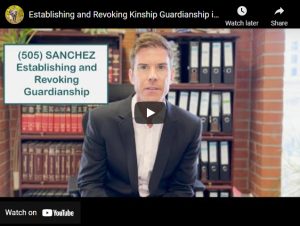Are you researching guardianship in Albuquerque, New Mexico?
If yes, this guide hits key points and laws that help you better understand guardianship in Albuquerque, New Mexico.
WHAT ARE THE TWO TYPES OF GUARDIANSHIP?
There are two types of guardianship in Albuquerque, New Mexico.
First, there is guardianship over an incapacitated adult. Adult guardianship may be granted based on mental or physical illness.
Adult guardianship is filed under the New Mexico Probate Code. For more information on adult guardianship, click HERE.
Second, there is guardianship over a child.
A caregiver can be granted guardianship when a parent is unfit to care for a child. In New Mexico, child guardianship is usually filed under the Kinship Guardianship Act.
Today, we will focus on guardianship of a minor in New Mexico.
GUARDIANSHP OF A MINOR IN NEW MEXICO
Guardianship of a minor in New Mexico is requested under the Kinship Guardianship Act.
This Act enables eligible caregivers to request guardianship of a minor. When granted, the caregiver steps into a parent’s shoes. In doing so, the guardian assumes parental rights and responsibilities.
Are you a loving caregiver that is caring for a minor?
Is the minor currently living in your home?
Are the minor’s parents unfit to care for the child?
If yes, you may be eligible to receive guardianship of a minor in New Mexico.
GUARDIANSHIP MEANING
In New Mexico, guardianship means that a caretaker assumes parental rights and responsibilities over a minor.
These rights do not include the right to consent to adoption.
In New Mexico, courts can also limit a guardian’s rights. Moreover, the court can grant the parent’s continued rights such as visitation or communication.
HOW DOES GUARDIANSHIP WORK?
Once granted, guardianship grants caregivers legal rights and responsibilities for a child.
These rights include the right to make medical and educational decisions.
In some situations, these rights include the ability to prevent communication or visitation between the child and parent.
Financially, guardians may be entitled to child support.
However, rights bring responsibilities. As such, guardianship also includes responsibilities.
These responsibilities include providing the child with adequate care, safety, and maintenance. Failing to provide adequate care could result in the guardianship being ended.
In extreme situations, abuse or neglect could result in CYFD involvement or criminal charges.
Check out this video for more information on child guardianship in New Mexico:
WHAT ARE THE COMMON GUARDIANSHIP PAPERS?
Common guardianship papers typically begin with a petition/request for guardianship.
In extreme cases, this request may include a motion for an order without a hearing. This motion includes an ex parte order (i.e., an order without a hearing).
Commonly, guardianship cases involve an order appointing temporary guardianship. This temporary order is effective for 180 days, or until the case is decided.
Are the parents consenting/agreeing to guardianship? If so, the case may involve a consent to guardianship.
Alternatively, are the parents’ contesting/fighting guardianship.? In this situation, the case may include an order appointing a Guardian Ad Litem (GAL).
Finally, an order appointing kinship guardian is needed when the court determines that guardianship best serves the child.
Once guardianship is granted, a parent may file a motion to revoke/end guardianship. This motion reopens the case.
GUARDIANSHIP VS. ADOPTION IN NEW MEXICO
Guardianship enables a caregiver to temporarily assume certain parental rights and responsibilities. In other words, guardianship is not permanent.
As such, the child’s parents can request to end guardianship when the circumstances have changed.
The other hand, adoption permanently ends the parent-child relationship.
Legally, child guardianship is usually filed with the domestic matters/family court. Conversely, adoption is filed through children’s court.
GUARDIANSHIP RESPONSIBILITIES AND DUTIES
Once granted, guardianship grants caregivers parental rights and duties/responsibilities. With that said, the court can limit a guardian’s rights or duties.
For example, the court may limit the guardian’s ability to change the child’s status quo medical, religious, or education.
Moreover, the court can grant the parents continued communication or visitation rights.
When requested, the court can grant the guardian child support.
Regarding duties, guardians have the duty to provide children with appropriate care. In other words, guardians cannot abuse or neglect children in their care.
GUARDIANSHIP AND PARENTAL VISITAITON
Once guardianship is granted, the court can enable the guardian to decide any communication or visitation between the child and parent.
In other words, in some cases the guardian decides when any other person can visit or communicate with the child.
Nevertheless, the court decides if parental visitation is appropriate. If so, the court can grant parental visitation/communication. Ultimately, the court decides parental visitation based on the child’s best interests.
Putting it differently, parental visitation is based on a case-by-case analysis.
WHEN DOES GUARDIANSHIP END?
Once granted, guardianship is temporary in nature. Nevertheless, “temporary” guardianship can extend permanently.
You see, “temporary” guardianship continues until the parties agree that guardianship ends, or the court decides that ending guardianship is best.
Sometimes, the guardians refuse to end guardianship. This refusal may occur even when a big change has occurred, and the parents can now care for the child.
In this situation, the rehabilitated parents must file a motion to revoke guardianship.
The parent, or person, requesting to revoke/end guardianship must provide a plan proposing how the child will transition from the guardian’s home.
Ultimately, the court decides if a change in circumstances has occurred. In doing so, the court focuses on the child’s best interests.
Putting it differently, the court will only revoke/end guardianship if the child is best served. In some cases, the process of revoking guardianship can be long, technical, and expensive.
Regarding the length and expense, a GAL may be necessary. If so, the GAL investigates the proposed revocation. In doing so, the GAL focuses on the child’s best interests.
Commonly, this GAL process can take three to six months to complete. Financially, this GAL process often costs around $5,000.
Check out this video for more information on how to revoke/end guardianship in New Mexico:
GUARDIANSHIP LAWYERS NEAR ME IN ALBUQUERQUE, NEW MEXICO
Are you seeking a top guardianship lawyer for legal advice? Alternatively, are you researching guardianship in Albuquerque, New Mexico? If yes, it is essential to speak with an experienced and knowledgeable guardianship attorney/lawyer.
Our legal team of guardianship attorneys have the experience that you need. Sanchez has handled complex guardianship cases across New Mexico. Sanchez commonly handles guardianship cases in Albuquerque, Rio Rancho, and Los Lunas/Belen.
You need sound guardianship legal advice from an experienced and hard-hitting guardianship attorney. Are you trying to establish or revoke guardianship in New Mexico? In either situation, Sanchez has the battle-tested experience that you need.
Call (505) SANCHEZ.











